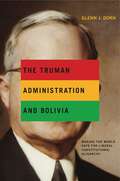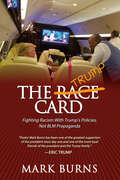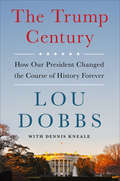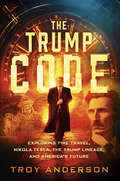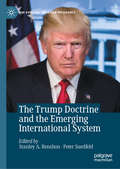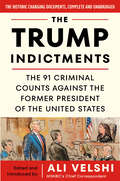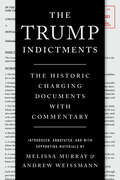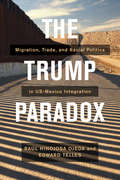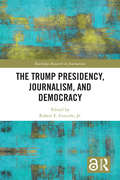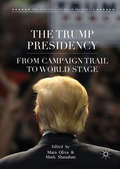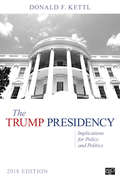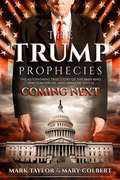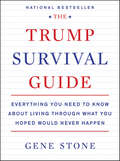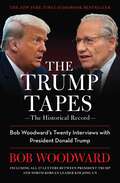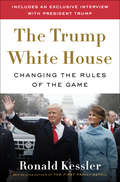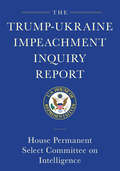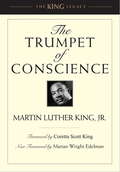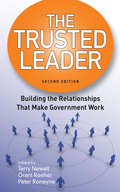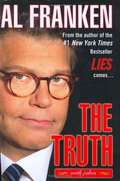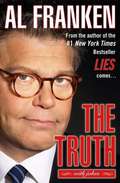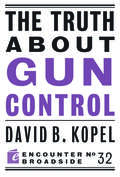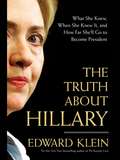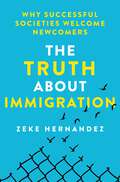- Table View
- List View
The Truman Administration and Bolivia: Making the World Safe for Liberal Constitutional Oligarchy
by Glenn J. DornThe United States emerged from World War II with generally good relations with the countries of Latin America and with the traditional Good Neighbor policy still largely intact. But it wasn’t too long before various overarching strategic and ideological priorities began to undermine those good relations as the Cold War came to exert its grip on U.S. policy formation and implementation. In The Truman Administration and Bolivia, Glenn Dorn tells the story of how the Truman administration allowed its strategic concerns for cheap and ready access to a crucial mineral resource, tin, to take precedence over further developing a positive relationship with Bolivia. This ultimately led to the economic conflict that provided a major impetus for the resistance that culminated in the Revolution of 1952—the most important revolutionary event in Latin America since the Mexican Revolution of 1910. The emergence of another revolutionary movement in Bolivia early in the millennium under Evo Morales makes this study of its Cold War predecessor an illuminating and timely exploration of the recurrent tensions between U.S. efforts to establish and dominate a liberal capitalist world order and the counterefforts of Latin American countries like Bolivia to forge their own destinies in the shadow of the “colossus of the north.”
The Truman Administration and Bolivia: Making the World Safe for Liberal Constitutional Oligarchy
by Glenn J. DornThe United States emerged from World War II with generally good relations with the countries of Latin America and with the traditional Good Neighbor policy still largely intact. But it wasn’t too long before various overarching strategic and ideological priorities began to undermine those good relations as the Cold War came to exert its grip on U.S. policy formation and implementation. In The Truman Administration and Bolivia, Glenn Dorn tells the story of how the Truman administration allowed its strategic concerns for cheap and ready access to a crucial mineral resource, tin, to take precedence over further developing a positive relationship with Bolivia. This ultimately led to the economic conflict that provided a major impetus for the resistance that culminated in the Revolution of 1952—the most important revolutionary event in Latin America since the Mexican Revolution of 1910. The emergence of another revolutionary movement in Bolivia early in the millennium under Evo Morales makes this study of its Cold War predecessor an illuminating and timely exploration of the recurrent tensions between U.S. efforts to establish and dominate a liberal capitalist world order and the counterefforts of Latin American countries like Bolivia to forge their own destinies in the shadow of the “colossus of the north.”
The Trump Card: Fighting Racism With Trump's Policies, Not BLM Propaganda
by Mark BurnsYou can&’t fight racism with racism. After reading this book, I will understand what is happening behind-the-scenes as the media and critical race theorists try to tear our nation apart. I will be able to stand up for conservative policies that will promote racial healing and unity for America. The mainstream media, critical race theorists, and the Black Lives Matter movement are working to divide Americans, not unite us. In this provocative book, Pastor Mark Burns, an outspoken conservative and longtime Trump surrogate, exposes: •How the mainstream media is helping create racial division •The money-hungry Marxists behind the Black Lives Matter movement •The dangers of critical race theory •Why Trump&’s policies are good for all Americans, including Black Americans •How he stopped playing the race card •Why the church must speak out against a racially divisive narrative Burns argues that the way to heal a racially divided nation and save America is not with the racist, status quo policies of Joe Biden and the Democrats, but with the conservative strategies that Trump has proven work—policies that promote Martin Luther King Jr.&’s vision for an America where people are not judged by the color of their skin but by the content of their character. The colors that matter most are not black and white but red, white, and blue.
The Trump Century: How Our President Changed the Course of History Forever
by Lou Dobbs Dennis KnealeHow did Donald Trump almost single-handedly reverse America’s decline?As the 21st Century began, the world’s only superpower was economically adrift, policing the world at the expense of American lives and trillions of dollars, weighed down by one-sided trade and security agreements with Europe and China ratified in a different era. Elites of both political parties battled over who would manage America’s decline from preeminent world power.In The Trump Century, the indomitable Lou Dobbs explains how Trump has steered the debate every day he has been in politics, greatly expanding what Washington thinks is possible. By 2016, the globalist elites demanded no one speak about limiting illegal immigration or securing our borders. The elites told you communist China would soon be like us, and the PC orthodoxy told you what you could or could not say. You were told America’s Middle Class could never grow again and wages would be stagnant into perpetuity. Trump reversed all of that as radical Democrats and the Deep State conspired to overthrow his Presidency, as the deadly pandemic raged, and orchestrated street protests and violent riots dominated news headlines. He not only made America great again but created a new standard for all future Presidents and likely has set the American agenda for the next hundred years. The Trump Century opens a window into Trump’s thinking on the economy, foreign policy, and border security and will energize his allies when they realize the future they’ve shaped.
The Trump Code: Exploring Time Travel, Nikola Tesla, the Trump Lineage, and America's Future
by Troy AndersonCould the Trump family&’s connections to time travel, esoteric knowledge, and secret societies hold clues to unlocking the mysteries of our past and future? By the end of this book, you will be able to connect the uncanny parallels between the novels Lockwood penned over a century ago and the Trump family legacy. Additionally, you will be able to solve the mystery to the upcoming 2024 election season. In the annals of American presidential history, there is no more peculiar tale than the eerie similarities between former President Donald Trump and a series of novels called, The Baron Trump Collection, penned by the obscure yet seemingly prophetic hand of American lawyer and novelist Ingersoll Lockwood in the late 1800s.The Trump Code delves into the connections between the Baron Trump novels and the enigmatic Trump family legacy, asking whether this nineteenth-century novelist foresaw the future of not only Trump but America and the world. It also uncovers a web of historical events and divine providence. Drawing from biblical passages about Enoch, Elijah, the Apostle John, the Mount of Transfiguration, and a mysterious verse in Ephesians on how Christ&’s followers are seated in &“heavenly places,&” along with theories of time travel by Albert Einstein, Nikola Tesla, and others, The Trump Code connects the pieces of this riveting puzzle, posing the question of whether &“truth is stranger than fiction,&” as Mark Twain famously said. As we peel back the layers of history, The Trump Code confronts questions that defy easy answers: Could this fictional novel hold clues to the upcoming 2024 presidential election, with all its division and chaos? Is there a divine hand guiding the course of human events, as suggested by the parallels in these novels between fiction and reality? Or are we witnessing the machinations of darker forces, hinted at by the curious numerology surrounding Lockwood&’s name?
The Trump Doctrine and the Emerging International System (The Evolving American Presidency)
by Stanley A. Renshon Peter SuedfeldPresident Donald J. Trump’s “America First” outlook has inspired both enthusiasm and condemnation among different segments of the American population. This book examines the meaning and implications of that perspective, and how the Trump Administration has implemented it—or failed to do so. Contributors, subject-matter experts with diverse points of view, place the Trump Doctrine within the succession of presidential foreign policy themes, and provide a case-by-case analysis of how it has been applied in specific regions and countries around the world. The book’s aim is to provide a fair and balanced assessment, relatively rare in this period of intense partisanship and impending national election.
The Trump Indictments: The 91 Criminal Counts Against the Former President of the United States
by Ali VelshiEdited and introduced by MSNBC’s Ali Velshi, The Trump Indictments collects the complete charging documents brought by the Department of Justice and the Fulton County (GA) and Manhattan (NY) district attorneys—a riveting and shocking narrative of the former president’s alleged crimes and conspiracies.“Despite having lost, the defendant was determined to remain in power…” So reads the compelling introduction to the Department of Justice’s second indictment against Donald Trump—one of four criminal cases brought against the former president. Purposely crafted as narratives to be read by the public, these documents are among the most consequential in American history, forcing the country to grapple with the critical question: does justice apply to the most powerful?Edited and with an introduction by MSNBC host Ali Velshi, The Trump Indictments collects all the charging documents against Trump and his co-defendants, providing critical insight on a decisive moment in our history. It is required reading as the country faces a pivotal reckoning—both in our justice system and at the ballot box.United States of America v. Donald J. Trump: 4 felony counts for conspiring to overturn the 2020 U.S. presidential election resultsUnited States of America v. Donald J. Trump, et al: 40 felony counts for mishandling of classified documentsThe State of Georgia v. Donald John Trump, et al.: 13 felony counts for leading a “criminal organization” that conspired to overturn Georgia’s electionPeople of the State of New York v. Trump: 34 felony counts concerning hush money payments made before the 2016 U.S. presidential election
The Trump Indictments: The Historic Charging Documents With Commentary
by Andrew Weissmann Melissa MurrayCollecting the four unprecedented indictments against Donald Trump, this essential volume features extensive commentary by NYU law professors and MSNBC contributors Melissa Murray and Andrew Weissmann. <p><p> In the long span of American history, Donald Trump is the first former president to face criminal indictment. He is the subject of a series of explosive charges across four cases: the January 6 case brought by Special Counsel Jack Smith; the election interference case in Georgia; the classified documents case also brought by Special Counsel Jack Smith; and the "hush money" case in New York. The Trump Indictments includes: • An introduction offering historical background and international comparisons for criminal charges against a former political leader. • The four indictments with annotations throughout, including insider notes from an eminent scholar (Murray) and a former federal prosecutor (Weissmann). • A cast of characters, from Trump and his alleged co-conspirators to notable Proud Boys and Oath Keepers who face prison sentences as a result of related January 6 cases. • A timeline that brings together in one place the critical events that led to the four indictments. A necessary handbook for anyone following the trials in 2024, The Trump Indictments will endure as an indispensable record of a democracy at the crossroads. <p> <b>New York Times Bestseller</b>
The Trump Paradox: Migration, Trade, and Racial Politics in US-Mexico Integration
by Edward Telles Raul Hinojosa-OjedaThe Trump Paradox: Migration, Trade, and Racial Politics in US-Mexico Integration explores one of the most complex and unequal cross-border relations in the world, in light of both a twenty-first-century political economy and the rise of Donald Trump. Despite the trillion-plus dollar contribution of Latinos to the US GDP, political leaders have paradoxically stirred racial resentment around immigrants just as immigration from Mexico has reached net zero. With a roster of state-of-the-art scholars from both Mexico and the US, The Trump Paradox explores a dilemma for a divided nation such as the US: in order for its economy to continue flourishing, it needs immigrants and trade.
The Trump Presidency, Journalism, and Democracy (Routledge Research in Journalism)
by Robert E. Gutsche Jr.This book examines the disruptive nature of Trump news – both the news his administration makes and the coverage of it – related to dominant paradigms and ideologies of U.S. journalism. By relying on conceptualizations of media memory and "othering" through news coverage that enhances socio-conservative positions on issues such as immigration, the book positions this moment in a time of contestation. Contributors ranging from scholars, professionals, and media critics operate in unison to analyze today’s interconnected challenges to traditional practices within media spheres posed by Trump news. The outcomes should resonate with citizens who rely on journalism for civic engagement and who are active in social change
The Trump Presidency: From Campaign Trail To World Stage (The\evolving American Presidency Ser.)
by Mara Oliva Mark ShanahanThis edited collection delves into the key aspects of the Trump campaign promises around immigration, trade, social and foreign policy, and unpicks how the first year of the presidency has played out in delivering them. It charts his first year from both historical and contemporary political standpoints, and in the context of comparative pieces stacking Trump’s performance against Gold-standard presidents such as Reagan, Kennedy and the last ‘outsider’, Eisenhower. Focusing in on a number of key elements of the presidency in depth, it offers a unique perspective on a presidency like no other, drawing on the overriding themes of populism, nativist nationalism and the battle for disengagement from the neoliberal power generation.
The Trump Presidency: Implications for Policy and Politics
by Donald F. KettlThe Trump Presidency: Implications for Policy and Politics explains the stakes of rapidly unfolding political, governing, and policy changes introduced by the Trump administration. Perfect for American Government courses, this timely supplement takes a critical look at cases and issues shaping today’s political environment and uses them as a framework to help students navigate through the dynamic, and often dramatic, changes the United States and the world are experiencing. Key Features: Case studies analyze Trump presidency executive orders to offer you practical examples of core American government concepts to explain how regulations are created and changed. “Action exercises” help you think critically about the current political environment and possible outcomes to the policies President Trump wants to create or change.
The Trump Presidency: Implications for Policy and Politics
by Donald F. KettlThe Trump Presidency: Implications for Policy and Politics explains the stakes of rapidly unfolding political, governing, and policy changes introduced by the Trump administration. Perfect for American Government courses, this timely supplement takes a critical look at cases and issues shaping today’s political environment and uses them as a framework to help students navigate through the dynamic, and often dramatic, changes the United States and the world are experiencing. Key Features: Case studies analyze Trump presidency executive orders to offer you practical examples of core American government concepts to explain how regulations are created and changed. “Action exercises” help you think critically about the current political environment and possible outcomes to the policies President Trump wants to create or change.
The Trump Prophecies: The Astonishing True Story of the Man Who Saw Tomorrow... and What He Says is Coming Next
by Mark Taylor Mary ColbertIn November of 2016, the world witnessed the impossible. Nearly every household in America was tuned in to the election feeds, and every update pointed to a loss for the Republican Party. But when the map of the states flipped red in the final hour, there were a select few who weren't surprised. They had always known Trump was going to win. He was chosen "for such a time as this. " The prophecy had said so. This prophet, this reserved man of God, was retired firefighter Mark Taylor. The word given by the Holy Spirit was delivered on April 28, 2011 in the middle of the most debilitating sickness a man could ever experience. When the prophecy later fell into the hands of New York Times bestsellers Don and Mary Colbert, God used this new team of passionate individuals to lead the nation into a fervent prayer chain that would accomplish one of the most incredible miracles our country has ever seen. But Trump's victory was only the beginning... What is coming next for the most powerful nation on earth today? Mark Taylor has more to say. In THE TRUMP PROPHECIES readers will discover: * How the Lord can and will use anyone--regardless of education, background, or health--to communicate His message to the Church of Christ * What led to the miracle of the 2016 election, the role of "we the people" for the will of God in the future, and what the Body of Christ needs to do to keep His blessing on our nation * How the enemy has utilized techniques of distraction to keep the Body's focus off of God and onto internal, demoralizing disputes--and how this can be overcome * Astounding, world-altering changes in our US government Mark sees on the horizon * The positive message of hope and encouragement that points to fresh methods of spreading the Gospel to the lost
The Trump Survival Guide: Everything You Need to Know about Living through What You Hoped Would Never Happen
by Gene StoneNational BestsellerDon’t despair. Don’t retreat. Fight back.A call-to-action for Democrats, moderate Republicans, and other anti-Trump dissenters, detailing the history of social and political policies, how Obama treated them, how Trump has the power to undermine them, and what people can do to fight back.The stunning election of Donald J. Trump rocked an already divided America and left scores of citizens, including the nearly sixty-five million voters who supported Hillary Clinton, feeling bereft and powerless. Now, Gene Stone, author of The Bush Survival Bible, offers invaluable guidance and concrete solutions the resistance can use to make a difference in this serious call-to-arms—showing them how to move from anger and despair to activism against the Trump presidency and its potentially lasting effects on our democracy. Before we can successfully engage, we need to be clear about the battles we face. Stone outlines political and social concepts—including such issues as Civil Rights, Women’s Rights, the Environment, Obamacare, International relations, and LGBTQ Rights—providing a brief history of each, a refresher on Obama's policies over his eight years in office, and an analysis of how Trump’s administration is threatening them. But lest we feel overwhelmed by the scale of the threat and settle for aimless outrage, Stone then provides an invaluable guide for fighting back—referring to organizations, people, sites, and countless other resources that are working tirelessly to restore the power of the people, safeguard our democracy, and ensure that none of us are left behind in our quest for relentless and equitable progress.While marches and social media are important forms of protest, concrete actions that achieve real and measurable change are a vital part of the fight. Positive and reinforcing, The Trump Survival Guide presents the essential information we need to effectively make our voices heard and our power felt, during the Trump presidency and beyond.
The Trump Tapes: Bob Woodward's Twenty Interviews with President Donald Trump
by Bob Woodward&“An uncharacteristic warning from one of the most respected, non-partisan journalists in the world&” —Jake Tapper, CNN &“It was riveting. I couldn&’t get enough of it.&” —Gayle King, CBS MorningsThe Trump Tapes explodes with the exclusive, inside story of Trump&’s performance as president—in his own words as he is questioned, even interrogated by Woodward, on the president&’s key responsibilities from managing foreign relations to crisis management of the coronavirus pandemic. This is the job Trump seeks again. How did he do the first time? This is the authentic answer, laying bare his repeated failures, obsessions, and grievances. The Woodward interviews take a reader to a reporter&’s laboratory meticulously examining the Trump presidency like never before—spellbinding and devastating. *Including all 27 letters between President Trump and North Korean Leader Kim Jong Un
The Trump White House: Changing the Rules of the Game
by Ronald KesslerThe unvarnished and unbiased inside story of President Donald Trump and his White House by New York Times bestselling author Ronald Kessler Based on exclusive interviews with the president and his staff, The Trump White House: Changing the Rules of the Game tells the real story of what Donald Trump is like, who influences him, how he makes decisions, what he says about the people around him, and how he operates when the television lights go off, while portraying the inside story of the successes that have already brought solid results as well as the stumbles that have turned off even longtime supporters and undercut his agenda.The Trump White House reveals: • Trump aides Ivanka Trump and her husband Jared Kushner have been responsible for Trump’s most disastrous decisions. Trump is aware that his daughter and son-in-law are problems and has hinted to them that they should go back to New York. Seeing Jared on TV, Trump said, “Look at Jared, he looks like a little boy, like a child.” • First Lady Melania Trump has a tremendous impact on policy and strategy. She sits in on meetings and is widely admired by aides for her judgment. • Kellyanne Conway is the No. 1 White House leaker. • Trump’s Secret Service Director Randolph “Tex” Alles proposed withdrawing protection from some Trump family members and aides to save money. Horrified White House staffers shot down the idea. • Trump has told friends that billionaires are constantly asking him to fix them up with longtime Communications Director Hope Hicks, a former model, but he says he refuses. • Trump calls certain reporters directly, feeding them stories attributed to “a senior White House official,” creating the impression that the White House leaks even more than it already does. Never before has an American president had so much impact on the country and the world in so short a time as Donald Trump. Yet no president has stirred so much controversy, dominating media coverage and conversation both pro and con. Months after Trump took office, consumer confidence hit a seventeen-year high, unemployment plummeted to the lowest level in seventeen years, and the stock market zoomed to repeated record highs. At the same time, ISIS was nearly defeated, Arab countries banded together to stop financing terrorists and promoting radical Islamic ideology, and Trump’s decision to send missiles into Syria because of its use of chemical weapons and his strident warnings to North Korean leader Kim Jong-un made it clear to adversaries that they take on the United States at their peril. Yet for all the media coverage, Trump remains a cipher. Ronald Kessler has known Trump and First Lady Melania Trump for two decades and understands him better than any other journalist. The book includes an exclusive interview with Trump, the only interview he says he has given or will give for a book as president. Crammed with media-grabbing revelations. The Trump White House is the unvarnished and unbiased inside story that answers the question: Who is Donald Trump?
The Trump-Ukraine Impeachment Inquiry Report and Report of Evidence in the Democrats' Impeachment Inquiry in the House of Representatives
by House Permanent Select CommitteeThis book includes BOTH the official report of the impeachment investigation by the House Intelligence Committee AND the document issued in response by House Republicans.A guidebook to the impeachment of President Trump, this two-in-one book contains BOTH the official report of the impeachment investigation by the House Intelligence Committee led by Adam Schiff AND the document issued in response issued by House Republicans led by Devin Nunes. And the package tells half the story: The book is published as a "flip" book -- that is, with each cover acting as a front cover, one for the Committee report, and one for the Republican report. Depending on which one you read first, you then flip the book over to read the other.
The Trumpet of Conscience
by Martin Luther KingIn November and December 1967, Dr. Martin Luther King, Jr., delivered five lectures for the renowned Massey Lecture Series of the Canadian Broadcasting Corporation. The collection was immediately released as a book under the title Conscience for Change, but after King's assassination in 1968, it was republished as The Trumpet of Conscience. The collection sums up his lasting creed and is his final testament on racism, poverty, and war. Each oration in this volume encompasses a distinct theme and speaks prophetically to today's perils, addressing issues of equality, conscience and war, the mobilization of young people, and nonviolence. Collectively, they reveal some of King's most introspective reflections and final impressions of the movement while illustrating how he never lost sight of our shared goals for justice. The book concludes with "A Christmas Sermon on Peace"--a powerful lecture that was broadcast live from Ebenezer Baptist Church on Christmas Eve in 1967. In it King articulates his long-term vision of nonviolence as a path to world peace.
The Trusted Leader: Building the Relationships that Make Government Work
by Grant Reeher Terry N. Newell Peter RonayneImproving government on a macro level is only possible with public managers who herald change on a micro level. While many studies of government reform focus on new policies and programs, these public managers—building relationships built on trust—are the real drivers behind many successful reforms.In this second edition, chapter authors once again draw on their real-world experience to demonstrate the importance of values-based leadership. With new research and lessons from the first two years of the Obama administration, chapters focus on the concrete ways in which leaders build effective relationships and trust, while also improving themselves, their organizations, and those they coach. Surveying agencies both horizontally and vertically, The Trusted Leader also addresses how public managers can collaborate with political appointees and the legislative branch, while still engaging with citizens to create quality customer experiences.Two brand-new chapters focus on:“Effective Conversations”—the importance of one-on-one conversations to building trust, with a model for having such conversations.“The Diversity Opportunity”—the need to effectively lead across a diverse workforce and a diverse society to build trust in both realms. With the addition of chapter headnotes, the editors provide necessary context, while the new “Resources for Further Learning” feature guides readers toward additional print and web resources.
The Truth (with jokes)
by Al FrankenFranken on Iraq, gay marriage, Bill Frist diagnosing Terri Schiavo, Bush's 9/11 Bait and Switch, moral values, the Social Security crisis and more
The Truth (with jokes)
by Al FrankenA New York Times BestsellerAl Franken's new book picks up where Lies and "The Al Franken Show" leave off. Armed with an arsenal of facts and research (and comedy!), Al is ready to take the fight to the Bush administration and its right-wing cronies. Intelligent, insightful, inspiring, and laugh-out-loud funny, Al's hard-hitting work of political satire is poised to become the most talked-about book of the year.
The Truth About Gun Control
by David B KopelWho is sovereign in the United States? Is it the people themselves, or is it an elite determined to rule citizens who are seen as incapable of making choices about their own lives? This is the central question in the American gun-control debate.In this Broadside, David Kopel explains why the right to keep and bear arms has always been central to the American identity - and why Americans have always resisted gun control. The American Revolution was sparked by British attempts to confiscate guns. After the Civil War, the U.S. changed the Constitution to defeat the nation's first gun-control organization, the Ku Klux Klan. When Hitler and Stalin demonstrated how gun registration paves the way for gun confiscation, which paves the way for genocide, Americans resolved to make sure it never happens here.Gun control is not an issue of left vs. right or urban vs. rural. The right to bear arms is crucial to prevent large-scale tyranny by criminal governments and small-scale tyranny by ordinary criminals - and to protect our Constitution.
The Truth About Hillary
by Edward KleinHillary Rodham Clinton is the most polarizing figure in American politics. Love her or hate her, everyone has a strong opinion about the former first lady turned senator who is almost certainly going to run for president in 2008. Despite more than a dozen years in the national spotlight and more than a dozen unauthorized books about her, she has managed to keep many secrets from the public especially about her turbulent marriage and its impact on her career. There have been plenty of rumors about what Hillary and Bill Clinton did behind closed doors, but never a definitive book that exposes the truth. Bestselling author Edward Klein draws on rare access to inside sources to reveal what Hillary knew and when she knew it during her years as first lady, especially during her husband’s impeachment. Klein’s book, embargoed until publication, will break news about the choices and calculations she has made over the years. It will also prove that she lied to America in her bestselling autobiography Living History. When she was just a little girl, Hillary Rodham dreamed of becoming the first female president, and her lifelong dream is almost within reach. But just as the swift boat veterans convinced millions of voters that John Kerry lacked the character to be president, Klein’s book will influence everyone who is sizing up the character of Hillary Clinton. .
The Truth About Immigration: Why Successful Societies Welcome Newcomers
by Zeke HernandezThe go-to book on immigration: fact-based, comprehensive, and nonpartisan.Immigration is one of the most controversial topics in the United States and everywhere else. Pundits, politicians, and the public usually depict immigrants as either villains or victims. The villain narrative is that immigrants pose a threat—to our economy because they steal our jobs; our way of life because they change our culture; and to our safety and laws because of their criminality. The victim argument tells us that immigrants are needy outsiders—the poor, huddled masses whom we must help at our own cost if necessary. But the data clearly debunks both narratives. From jobs, investment, and innovation to cultural vitality and national security, more immigration has an overwhelmingly positive impact on everything that makes a society successful.In The Truth About Immigration, Wharton professor Zeke Hernandez draws from nearly 20 years of research to answer all the big questions about immigration. He combines moving personal stories with rigorous research to offer an accessible, apolitical, and evidence-based look at how newcomers affect our local communities and our nation. You'll learn about the overlooked impact of immigrants on investment and job creation; realize how much we take for granted the novel technologies, products, and businesses newcomers create; get the facts straight about perennial concerns like jobs, crime, and undocumented immigrants; and gain new perspectives on misunderstood issues such as the border, taxes, and assimilation.Most books making a case for immigration tell you that immigration is good for immigrants. This book is all about how newcomers benefit you, your community, and your country. Skeptics fear that newcomers compete economically with locals because of their similarities and fail to socially assimilate because of their differences. You'll see that it's exactly the opposite: newcomers bring enduring economic benefits because of their differences and contribute positively to society because of their similarities. Destined to become the go-to book on one of the most important issues of our time, this book turns fear into hope by proving a simple truth: immigrants are essential for economically prosperous and socially vibrant nations.
